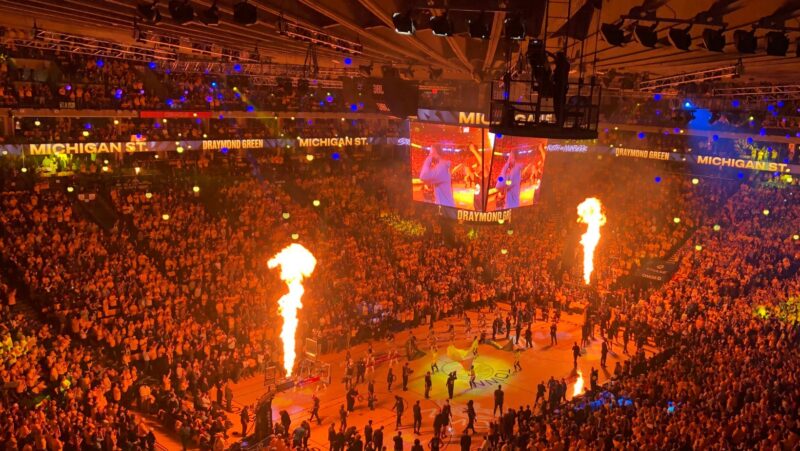
As the 2025 NBA Playoffs unfold across both conferences, teams are facing the pressure that only this stage can deliver. In arenas packed with intensity, the postseason is revealing who’s truly built for a championship push and who’s struggling to keep pace. With every buzzer-beater, upset, and injury, contenders are being separated from pretenders. The current phase of the playoffs—playing out in May 2025—has become a test of strategy, endurance, and mental toughness, proving once again that winning in this league requires far more than just talent.
Boston’s Balance Is Being Tested—And That’s Not a Bad Thing
The Boston Celtics came into the playoffs with the league’s best record and one of the deepest rosters in basketball. What we’re learning, though, is that depth can be neutralized when opponents disrupt your rhythm. In Game 1 against the New York Knicks, Boston’s reliance on perimeter play clashed with New York’s aggressive on-ball defense. The Celtics lost in overtime despite strong showings from Jayson Tatum and Jaylen Brown.
What’s most telling is how Boston responds when they can’t dictate pace. Their transition game slows, their ball movement suffers, and they lean on iso sets that stall possessions. But if any NBA team can afford a Game 1 stumble, it’s this one. Joe Mazzulla’s squad has the pieces—they just need to prove they can adjust under pressure. If they settle into a rhythm and recover from this early punch, they remain the East’s most complete team.
Indiana’s Identity Is No Longer a Secret
The Indiana Pacers have stormed into the spotlight with a performance that’s not just spirited—it’s strategic. Their win over the Cleveland Cavaliers in Game 1 was more than an upset; it was a message. Indiana’s offense moves quickly, decisively, and forces mismatches without relying on isolation stars. Tyrese Haliburton continues to prove that tempo control and passing vision can beat brute force.
Staying updated on injury reports and player availability has become essential, especially as the Cavaliers deal with uncertainty surrounding Evan Mobley and Darius Garland. The latest NBA news has made it clear that Cleveland’s rotation may look different from game to game, and that volatility plays directly into Indiana’s favor. With Cleveland losing its defensive anchor and primary ball handler, Indiana’s chemistry and momentum are suddenly more than just exciting—they’re threatening.
They may not have title expectations, but they’re playing like a team that believes.
Denver Is Winning With Composure—Again
No team handles postseason tension quite like the Denver Nuggets. Their Game 1 win over the Oklahoma City Thunder came down to late-game poise. With Nikola Jokić orchestrating from the high post and Aaron Gordon drilling the dagger three, Denver once again proved that execution trumps explosiveness. They don’t panic. They don’t rush. And they force their opponent to make the first mistake.
This isn’t new. The defending champions understand when to accelerate and when to grind. What’s emerging now, though, is how critical Gordon, Jamal Murray, and the supporting cast are to Jokić’s dominance. Without that surrounding consistency, his vision wouldn’t translate into points. In a Western Conference stacked with rising stars, Denver’s biggest advantage may be its maturity and trust in the system. That’s difficult to replicate—and even harder to disrupt.
Oklahoma City Has the Talent, But Not Yet the Timing
The Thunder are electric, unpredictable, and fearless. But in close playoff games, youth often stumbles. That was the case in Game 1 against Denver. Shai Gilgeous-Alexander continues to perform at an MVP level, but his teammates struggled in late-game scenarios where each possession is magnified. Their spacing faltered. Their defensive switches lagged. And most of all, their decision-making looked rushed.
Still, what we’re learning about Oklahoma City is promising. They have a legitimate star, a promising core, and one of the best home crowds in the league. What they don’t have yet is experience. The Thunder aren’t far from being a serious Finals contender, but this postseason might be more about learning how to lose the right way than winning it all.

If they take notes from Denver’s composure, the next leap could come quickly.
Golden State Still Has That Switch—but for How Long?
The Golden State Warriors are a paradox. They looked dead in the water halfway through their series with Houston, only to storm back with vintage shot-making and smarter rotations. Buddy Hield’s 33-point performance in Game 7 reminded everyone that championship DNA doesn’t disappear—it just needs the right spark. Stephen Curry still commands attention, and Draymond Green still orchestrates the defense. What’s especially interesting is how public perception continues to cling to Golden State’s legacy—even when the metrics tell a different story. Reputable online sportsbooks like FanDuel often reflect that sentiment in how the odds are shaped early in a series, particularly when the Warriors are involved. Bettors and fans alike seem reluctant to count them out, even when form and fatigue suggest otherwise.
But this version of the Warriors is walking a tightrope. They rely on shooting variance more than ever, and their margin for error is razor thin. Against a physical, youthful Minnesota team, fatigue could become their biggest opponent. What we’re learning is that experience can win early—but sustainability will require more than memory. If they can string together consistent bench play and manage minutes wisely, they’ll be dangerous. If not, the magic may fade quickly.
New York Is Playing With Nothing to Lose—and It Shows
The Knicks weren’t supposed to walk into Boston and win Game 1. But they did, and not by accident. This isn’t just Jalen Brunson’s team—it’s a group that knows its identity and embraces the grind. They crash the boards, they defend every inch of the court, and they rarely beat themselves. What’s becoming clear is how important Miles McBride, Josh Hart, and the bench have become.
New York may not dominate headlines with flair, but they deliver with consistency. They understand playoff basketball: limit turnovers, control tempo, and never give up a run without responding. They’ve turned Madison Square Garden into a hostile environment for visitors, and they travel with the same intensity. This isn’t a team afraid of the moment. If their legs hold up and Brunson continues to lead, they’ll be a nightmare for whoever comes next.













